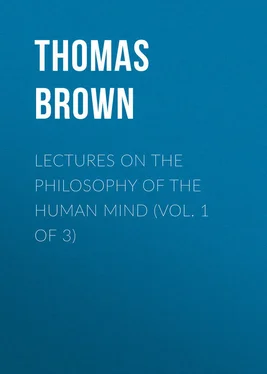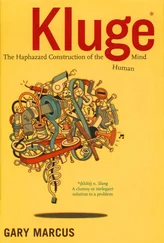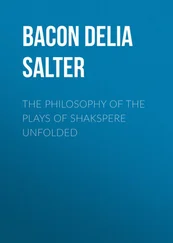Thomas Brown - Lectures on the Philosophy of the Human Mind (Vol. 1 of 3)
Здесь есть возможность читать онлайн «Thomas Brown - Lectures on the Philosophy of the Human Mind (Vol. 1 of 3)» — ознакомительный отрывок электронной книги совершенно бесплатно, а после прочтения отрывка купить полную версию. В некоторых случаях можно слушать аудио, скачать через торрент в формате fb2 и присутствует краткое содержание. Жанр: foreign_antique, foreign_prose, на английском языке. Описание произведения, (предисловие) а так же отзывы посетителей доступны на портале библиотеки ЛибКат.
- Название:Lectures on the Philosophy of the Human Mind (Vol. 1 of 3)
- Автор:
- Жанр:
- Год:неизвестен
- ISBN:нет данных
- Рейтинг книги:5 / 5. Голосов: 1
-
Избранное:Добавить в избранное
- Отзывы:
-
Ваша оценка:
- 100
- 1
- 2
- 3
- 4
- 5
Lectures on the Philosophy of the Human Mind (Vol. 1 of 3): краткое содержание, описание и аннотация
Предлагаем к чтению аннотацию, описание, краткое содержание или предисловие (зависит от того, что написал сам автор книги «Lectures on the Philosophy of the Human Mind (Vol. 1 of 3)»). Если вы не нашли необходимую информацию о книге — напишите в комментариях, мы постараемся отыскать её.
Lectures on the Philosophy of the Human Mind (Vol. 1 of 3) — читать онлайн ознакомительный отрывок
Ниже представлен текст книги, разбитый по страницам. Система сохранения места последней прочитанной страницы, позволяет с удобством читать онлайн бесплатно книгу «Lectures on the Philosophy of the Human Mind (Vol. 1 of 3)», без необходимости каждый раз заново искать на чём Вы остановились. Поставьте закладку, и сможете в любой момент перейти на страницу, на которой закончили чтение.
Интервал:
Закладка:
for the critic requires only one of the two great talents, which in the poet, ought to exist together, but which may yet exist separately. In the poet, there must be, in the first place, an inventive fancy to bring together thoughts and images which have never been combined before; and with this inventive fancy, a discriminating judgment, which is to measure, by the standard of nature, the products of invention; and to retain them, only if they appear such, as though perhaps never before combined, might yet, in conformity with the natural laws of thought, have occurred to a mind, in the circumstances represented, as truly, as the other thoughts or images, which the works of other poets have rendered more familiar. This latter talent, – the judgment which determines the intrinsic beauty and fidelity to general nature, – is all which is absolutely requisite to the critic , who is not, therefore, under the necessity of being himself “the great sublime” which he draws. Yet, though all the elements of excellence in the artist are not absolutely requisite for the judgment of the sage and discriminating admirer of the noble works which that excellence may have produced, some of these elements unquestionably are requisite, – elements, for which the critic may search in vain in all the rules of rhetoricians, and even in the perusal of all the masterpieces of ancient and modern times, unless, to an acquaintance with these, he add an accurate acquaintance with that intellectual and moral nature of man , the beautiful conformity to which was the essential charm of all the pathos, and all the eloquence, which he has admired.
There is another art, however, to which knowledge of the intellectual and moral nature of man is still more important – that noble art, which has the charge of training the ignorance and imbecility of infancy into all the virtue, and power, and wisdom of maturer manhood – of forming, of a creature, the frailest and feeblest perhaps which heaven has made, the intelligent and fearless sovereign of the whole animated creation, the interpreter, and adorer, and almost the representative of the Divinity. The art, which performs a transformation so wondrous, cannot but be admirable itself; and it is from observation of the laws of mind, that all which is most admirable in it is derived. These laws we must follow indeed, since they exist not by our contrivance, but by the contrivance of that nobler wisdom, from which the very existence of the mind has flowed; yet, if we know them well, we can lead them, in a great measure, even while we follow them. And, while the helpless subject of this great moral art is every moment requiring our aid, – with an understanding that may rise, from truth to truth, to the sublimest discoveries, or may remain sunk forever in ignorance, and with susceptibilities of vice that may be repressed, and of virtue that may be cherished, – can we know too well the means of checking what is evil, and of fostering what is good? It is too late to lie by, in indolent indulgence of affection, till vice be already formed in the little being whom we love, and to labour then to remove it, and to substitute the virtue that is opposite to it. Vice already formed, is almost beyond our power. It is only in the state of latent propensity, that we can with much reason expect to overcome it by the moral motives which we are capable of presenting; and to distinguish this propensity before it has expanded itself, and even before it is known to the very mind in which it exists, – to tame those passions which are never to rage, and to prepare, at a distance, the virtues of other years, – implies a knowledge of the mental constitution, which can be acquired only by a diligent study of the nature, and progress, and successive transformations of feeling. It is easy to know, that praise or censure, reward or punishment, may increase or lessen, the tendency to the repetition of any particular action; and this, together with the means of elementary instruction, is all which is commonly termed education . But the true science of education is something far more than this. It implies a skilful observation of the past, and that long foresight of the future, which experience and judgment united afford. It is the art of seeing, not the immediate effect only, but the series of effects which may follow any particular thought or feeling, in the infinite variety of possible combinations – the art often of drawing virtue from apparent evil, and of averting evil that may rise from apparent good. It is, in short, the philosophy of the human mind applied practically to the human mind, – enriching it, indeed, with all that is useful or ornamental in knowledge, but at the same time giving its chief regard to objects of yet greater moment – averting evil, which all the sciences together could not compensate, or producing good, compared with which all the sciences together are as nothing.
Footnotes
LECTURE IV
RELATION OF THE PHILOSOPHY OF MIND TO THE CULTIVATION OF MORAL FEELING
We have already, Gentlemen, considered the relation which the Philosophy of Mind bears to the Sciences in general , and its particular application to those sciences and arts, in which the mind is not merely the instrument with which we carry on our intellectual operations, but the very subject on which we operate, as in the great arts of reasoning, and persuading, of delighting with all the charms of poetry and eloquence, of judging of the degrees of excellence that have been attained in these delightful arts; and, still more, its application to the noblest, though, in proportion to its value, the least studied of all the arts, the art of education . It remains still, to point out some moral effects which the study of the Science of Mind produces in the inquirer himself , effects which may not be obvious at first sight, but which result from it, as truly as the intellectual advantages already pointed out.
One very powerful and salutary influence of moral science arises directly from the mere contemplation of the objects with which it is conversant – the benevolent affections, the pleasure which attends these, the sacrifices that are made by generous virtue, and all the sublime admiration which they excite – the sordid and malevolent, and joyless passions of the selfish – the fear and shame that attend the guilty in society, and the horrors that, with a certainty of constant return more dreadful than their very presence, await them in their solitary hours. It is good to have these often before us, and to trace and contrast all the immediate, and all the remote effects of vice and virtue, even though we should form, at the time, no direct reference to our own past or future conduct. Without any such reference to ourselves, we must still be sensible of the pleasure and serene confidence which attend the one, and of the insecurity and remorse which forever hang over the other; and the remaining impressions of love and disgust, will have an influence on our future conduct, of which we may probably be altogether unconscious at the time. It is, in truth, like the influence of the example of those with whom we habitually associate, which no one perceives at any particular moment, though all are every moment subject to it; and to meditate often on virtue and happiness, is thus almost to dwell in a sort of social communion with the virtuous and happy. The influence of moral conceptions has, in this respect, been compared to that of light , which it is impossible to approach, without deriving from it some faint colouring, even though we should not sit in the very sunshine, – or to that of precious odours , amid which we cannot long remain, without bearing away with us some portion of the fragrance. “Ea enim philosophiæ vis est, ut non solum studentes, sed etiam conversantes juvet. Qui in solem venit, licet non in hoc venerit, colorabitur: qui in unguentaria taberna resederunt, et paulo diutius commorati sunt, odorem secum loci ferunt: et qui apud philosophiam fuerunt, traxerint aliquid necesse est, quod prodesset etiam negligentibus.” 14 14 Seneca, Ep. 108.
Интервал:
Закладка:
Похожие книги на «Lectures on the Philosophy of the Human Mind (Vol. 1 of 3)»
Представляем Вашему вниманию похожие книги на «Lectures on the Philosophy of the Human Mind (Vol. 1 of 3)» списком для выбора. Мы отобрали схожую по названию и смыслу литературу в надежде предоставить читателям больше вариантов отыскать новые, интересные, ещё непрочитанные произведения.
Обсуждение, отзывы о книге «Lectures on the Philosophy of the Human Mind (Vol. 1 of 3)» и просто собственные мнения читателей. Оставьте ваши комментарии, напишите, что Вы думаете о произведении, его смысле или главных героях. Укажите что конкретно понравилось, а что нет, и почему Вы так считаете.












![Anne Blunt - A Pilgrimage to Nejd, the Cradle of the Arab Race. Vol. 1 [of 2]](/books/749489/anne-blunt-a-pilgrimage-to-nejd-the-cradle-of-the-thumb.webp)